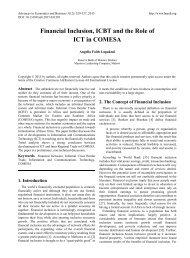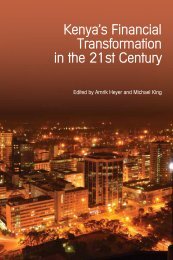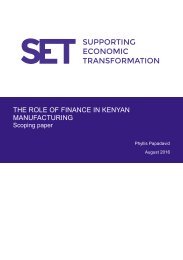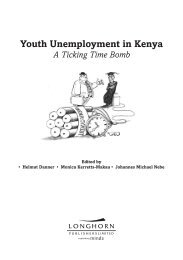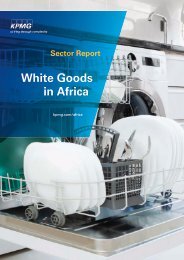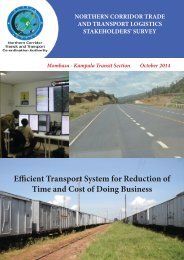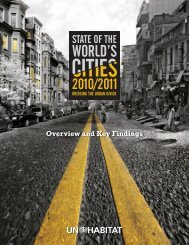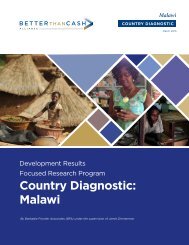FD
gvti301SEaf
gvti301SEaf
Create successful ePaper yourself
Turn your PDF publications into a flip-book with our unique Google optimized e-Paper software.
AFRICA<br />
of people at risk of food insecurity. The drought will probably<br />
dampen growth in a number of countries, including Ethiopia,<br />
Malawi, and Zambia, and food inflation is accelerating in<br />
many countries. Humanitarian needs are putting additional<br />
strain on the budgetary and external positions of many of the<br />
affected countries. The impact of the drought varies across<br />
countries, but whenever food security is precarious, there are<br />
severe human costs. And this already tragic situation could<br />
still get a lot worse; a shocking 40 to 50 million people are<br />
likely to be food insecure by the end of 2016.<br />
Strong potential<br />
This confluence of factors is exerting serious headwinds.<br />
But does this mean that the region’s growth momentum has<br />
stalled? I don’t think so—for several reasons.<br />
First, the overall weak picture masks, as usual, widely<br />
varying circumstances—not surprising, given that the<br />
region is home to 45 very diverse countries. Many countries<br />
across the region, notably those with the lowest income,<br />
continue to register robust growth. Most oil importers are<br />
generally faring better, with growth over 5 percent, often<br />
supported by ongoing infrastructure investment and strong<br />
private consumption. For instance, growth in Kenya is projected<br />
to rise to 6 percent in 2016, aided by investment in<br />
the transportation sector, a pickup in electricity production,<br />
and a rebound in tourism. Similarly, Senegal is expected to<br />
see continued strong growth at 6½ percent, supported by<br />
improving agricultural productivity and a dynamic private<br />
sector. In CÔte d’Ivoire, high cocoa prices and good<br />
agricultural production, as well as an anticipated boost<br />
in investment following the recent presidential election,<br />
should drive growth to 8½ percent this year. In some other<br />
countries, such as the Central African Republic, growth<br />
prospects are now rebounding from severe shocks or with<br />
the attenuation of conflict. And the decline in oil prices has<br />
benefited many of these countries, though the drop in other<br />
commodity prices and currency depreciations have partly<br />
offset the gains.<br />
More broadly, the region’s medium-term growth prospects<br />
continue to be favorable. True, the near-term outlook for<br />
many sub-Saharan African countries remains difficult and<br />
clouded by risks. But generally the underlying domestic drivers<br />
of growth over the past decade or so still persist. In particular,<br />
the much improved business environment and favorable<br />
demographics are likely to play an important role in supporting<br />
growth in the coming decades.<br />
Pressing the reset button<br />
While the region’s growth potential remains strong, the current<br />
slowdown highlights that the region is not immune to the<br />
multiple transitions afoot in the global economy. As a result,<br />
to reap the region’s strong potential, a significant policy reset<br />
is critical in many cases. Such a reset is particularly urgent in<br />
two groups of countries—the region’s commodity exporters<br />
and countries with access to international capital markets.<br />
For natural resource exporters, a robust and prompt<br />
shift in policy response is needed given the prospect of an<br />
extended period of sharply lower commodity prices. To<br />
date, commodity exporters—particularly oil exporters—<br />
have generally responded hesitantly and insufficiently to<br />
the historically large terms-of-trade decline they are experiencing.<br />
Faced now with rapidly depleting fiscal and foreign<br />
reserves and constrained financing, they must respond<br />
quickly and strongly to prevent a disorderly adjustment and<br />
to lay the groundwork for a quicker, durable, and inclusive<br />
economic recovery.<br />
For countries that are not part of a monetary union,<br />
exchange rate flexibility should be part of the first line of<br />
defense against commodity price declines, as part of a broader<br />
macroeconomic policy package. Because the fall in revenues<br />
from the extractive sector will likely be long lived, many<br />
affected countries also must contain fiscal deficits and build<br />
a sustainable tax base from the rest of the economy. In their<br />
consolidation efforts, countries should aim to preserve priority<br />
spending, such as social expenditures and growth-friendly<br />
capital investments, also with a view to maintaining their longer-term<br />
development goals.<br />
The region is not immune to the<br />
multiple transitions afoot in the<br />
global economy.<br />
Driven by the favorable external financing environment<br />
of recent years, fiscal and external current account deficits<br />
have grown substantially in many of the region’s frontier<br />
markets, as they sought to strengthen their weak infrastructure,<br />
including roads, railways, and electricity and water<br />
networks. Now that external financing is much tighter,<br />
these countries will need to reduce their fiscal deficits—<br />
depending on the country’s circumstances—either by better<br />
prioritizing spending or by boosting tax revenues. That will<br />
help these countries rebuild cushions against possible worsening<br />
of external conditions.<br />
Indeed, the current challenges sub-Saharan Africa faces<br />
are a sobering reminder of the need to strengthen resilience<br />
against external shocks. Structural measures, such as enhancing<br />
the business climate and improving the quality of public<br />
investment, would nurture the private sector and help diversify<br />
the export base and sources of growth and jobs beyond<br />
commodities. In addition, further developing the region’s<br />
financial sector, including by strengthening legal frameworks<br />
and corporate governance, could also help.<br />
Now is the time to reset policies to address current challenges<br />
and ensure the resumption of Africa’s strong rising<br />
path. The required measures may cause a short-term slowdown<br />
in growth, but they will prevent the risk of crises if<br />
action is not taken promptly. With that, I believe countries<br />
in the region will be well positioned to reap their substantial<br />
economic potential. ■<br />
Finance & Development June 2016 13




